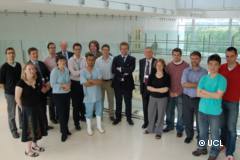
“Treatment of prostate cancer on verge of change”
In May 2010 around fifty eminent professionals gathered in New York for the third Pelican Prostate Colloquium in New York. The meeting was hosted by Dr. Peter Scardino, Chairman of Surgery and and Dr. Hedvig Hricak, Chair of the Department of Radiology, both of Memorial Sloan-Kettering Cancer Center in New York and co-chaired by Professor Mark Emberton of University College Hospital, London. Principally the topics discussed were how to improve the detection and characterization of prostate cancer, involving precision imaging and biopsy technique, and how to reduce over-treatment.
The consensus achieved at the gathering was that MR Imaging, which, if placed in the prostate cancer diagnostic pathway, could provide a strategy by which some of the problems of over-diagnosis, and over- and under-treatment, of men may be corrected. It was suggested that MRI could potentially improve both focal therapy and active surveillance.
Delegates noted a significant difference in the approach to initial prostate cancer treatment between the USA and the UK, with more UK patients opting for less invasive testing and a greater acceptance of active surveillance.
This was described in the British Medical Journal by Professor Mark Emberton, Reader in interventional oncological surgery at University College Hospital, London, as a ‘sea change in managing prostate cancer`. He added, ‘until very recently our methods of imaging were not good enough to locate the cancer within the prostate. This meant that biopsies had to be untargeted and subject to chance. It also meant that any treatment had to be directed at the whole gland, because the extent and location of the cancer was uncertain’. He believes that we are at a threshold where imaging in the form of multi-sequence MRI might assist us in moving towards targeted biopsies and targeted treatments. The experts attending the Colloquium were unanimous that if imaging could be used in this manner that the diagnostic and therapeutic pathways would change. Studies addressing the performance of MRI in this setting are underway.